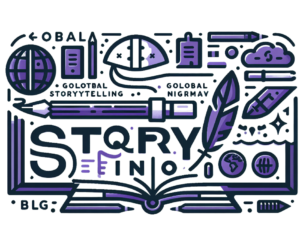The world of literature is ever-evolving, constantly adapting to the nuances of contemporary society. Modern short stories, in particular, serve as a powerful lens through which we can examine the current societal landscape. As we delve into 2024, various themes have emerged in short stories that not only reflect the complexities of modern life but also challenge readers to confront and contemplate significant issues. This article will explore key contemporary themes in modern short stories, focusing on how they reflect society in 2024.
The Rise of Digital Narratives
One of the most prominent themes in contemporary short stories is the rise of digital narratives. With technology shaping our interactions and relationships, many authors are exploring the impact of social media, virtual realities, and online personas. In 2024, short stories often depict characters navigating the blurred lines between their real lives and digital identities.
For example, in a short story about a young woman obsessed with her online presence, the narrative may delve into themes of anxiety and self-worth tied to likes and followers. Through this exploration, authors are able to critique societal expectations of beauty, success, and authenticity in the age of social media. The format of the short story, with its brevity and immediacy, allows for a snapshot of these complex themes, making them accessible and relatable to readers.
Identity and Intersectionality
As society becomes increasingly diverse, issues of identity and intersectionality are crucial themes in modern short stories. Writers are keenly aware of how race, gender, sexual orientation, and socioeconomic status intersect, influencing individual experiences and societal perceptions.
In 2024, we see stories that highlight marginalized voices and experiences. For instance, a narrative featuring a biracial protagonist grappling with cultural identity may explore the dualities of belonging and alienation. By weaving personal stories into the fabric of broader social issues, authors foster empathy and understanding among readers. This theme not only reflects the realities of contemporary society but also encourages readers to engage with issues of privilege and representation.
Environmental Awareness
The urgency of climate change and environmental degradation is another prominent theme in modern short stories. As the world grapples with these challenges, authors are increasingly using their craft to raise awareness and provoke action.
In 2024, stories that address environmental issues often take on a speculative or dystopian tone, illustrating possible futures if current trends continue. For instance, a short story may depict a community fighting against corporate greed to protect their natural resources. Such narratives not only serve as cautionary tales but also inspire readers to reflect on their own relationship with the environment. By situating these themes in the short story format, authors can engage readers emotionally, prompting them to consider their role in fostering a sustainable future.
Mental Health and Emotional Well-being
The theme of mental health continues to gain traction in contemporary literature, particularly as societal stigma surrounding mental health issues diminishes. In 2024, modern short stories often explore characters grappling with anxiety, depression, and the complexities of emotional well-being.
Writers use the short story format to capture fleeting moments of struggle and resilience, providing readers with intimate glimpses into the characters’ inner lives. A story might depict a young man dealing with the aftermath of a traumatic event, allowing readers to experience his journey toward healing. By addressing mental health openly, these narratives contribute to a broader conversation about emotional well-being, encouraging readers to seek help and support.
Social Justice and Activism
Another significant theme in contemporary short stories is social justice and activism. As movements for racial equality, gender rights, and climate action gain momentum, authors are responding with powerful narratives that illuminate injustices and inspire change.
In 2024, short stories often depict protagonists who become catalysts for social change, reflecting the growing importance of activism in society. A narrative might follow a group of friends organizing a protest against systemic inequality, showcasing the power of collective action. Through these stories, authors encourage readers to reflect on their own beliefs and actions, fostering a sense of responsibility toward social justice.
The Quest for Connection
In an increasingly isolated world, the quest for human connection remains a central theme in modern short stories. As individuals grapple with loneliness and disconnection in the digital age, authors are exploring the myriad ways in which people seek companionship and understanding.
In 2024, stories may focus on unexpected relationships that blossom in the most unlikely circumstances. For example, a tale about two strangers who meet on a train journey could explore themes of shared vulnerability and the power of empathy. By highlighting the importance of connection, these narratives resonate deeply with readers, reminding them of the value of human relationships in an often disconnected world.
The Role of Memory and Nostalgia
Memory and nostalgia play significant roles in shaping our identities and experiences. In contemporary short stories, authors frequently delve into how memories influence characters’ present lives and perceptions of the future.
In 2024, narratives that explore memory might highlight the tension between past and present, examining how individuals navigate their histories to find meaning and purpose. A story could feature an older character reflecting on their youth, contemplating how their experiences have shaped their current beliefs. This theme not only offers insights into the human condition but also invites readers to reflect on their own memories and the lessons they carry.
Humor as a Coping Mechanism
Amid the challenges of modern life, humor emerges as a crucial theme in contemporary short stories. Many authors use humor to address serious topics, allowing readers to engage with difficult subjects in a more accessible manner.
In 2024, stories may feature characters who navigate absurd situations with wit and resilience. For instance, a narrative about a woman dealing with the chaos of a family reunion might use humor to explore themes of family dynamics and personal growth. By incorporating humor, authors provide a sense of relief and camaraderie, reminding readers that laughter can be a powerful tool for coping with life’s complexities.
Conclusion
Contemporary themes in modern short stories reflect the dynamic and multifaceted nature of society in 2024. From digital narratives and identity exploration to environmental awareness and social justice, these stories serve as mirrors, reflecting the challenges and triumphs of our time. Through the lens of short fiction, readers are invited to engage with pressing issues, fostering empathy and understanding.













